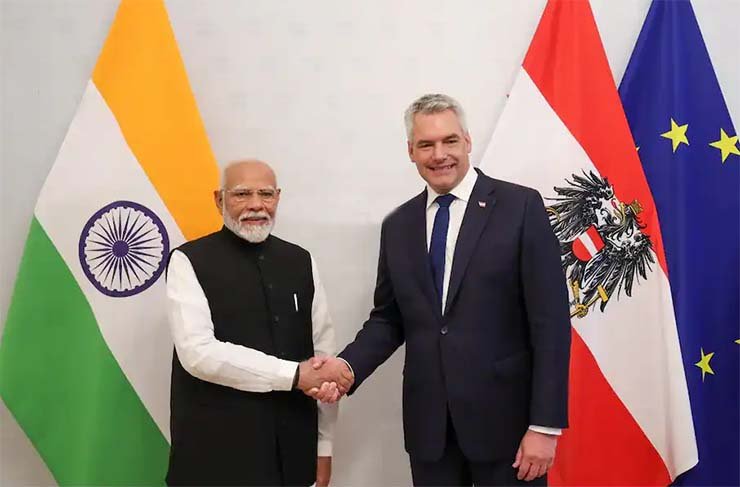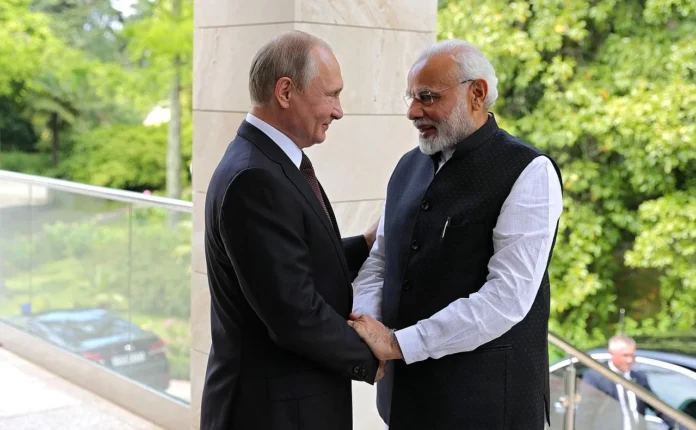Prime Minister Narendra Modi’s first bilateral visits, during his third term in office, to Russia and Austria have concluded, giving the international community much needed fodder to discuss and debate over India’s foreign policy approach in the intricate geopolitical situation beset with two on-going wars – one in Europe and another in the Middle East.
While the Indian PM’s visit, helped New Delhi in deepening its special and strategic partnership with Moscow, there were heartburns in the West on account of personal chemistry between PM Modi and President Vladimir Putin, which was splendidly displayed through bear hugs, conferring the visiting Indian PM with Russia’s highest national award, the Order of St Andrew the Apostle and hosting Modi for an informal gathering at his official residence at Novo-Ogaryovo.
Western jitters over Modi-Putin bonhomie
First to react somewhat angrily against the bear hugs and the warmth displayed between PM Modi and President Putin, towards each other, was Ukrainian President Volodymyr Zelensky who wrote on the social media, “It is a huge disappointment and a devastating blow to peace efforts to see the leader of the world’s largest democracy hug the world’s most bloody criminal in Moscow on a such a day.” However, it should not be forgotten that the day Putin was hosting PM Modi in Moscow, a Russian missile had struck a children’s hospital in Kyiv, killing 29 people.
However, it was the US which appeared to be highly rattled by PM Modi’s visit to Russia. “We have been quite clear about our concerns about India’s relationship with Russia. We have expressed those privately and directly to the Indian government, and continue to do so. And that has not changed.” US State Department Spokesperson Matthew Miller said during his daily news briefing on July 11.
On its part, India would like to enhance its footprint in Russia’s Far East through trade and investment in the sectors of agriculture, energy, mining, manpower, diamonds, pharmaceuticals, and maritime transport
On the same day, US Ambassador to India, Eric Garcetti in New Delhi also raised a critical voice against India over its pursuance of strategic autonomy in relationship with foreign countries, including Russia. Without referring to PM Modi’s visit to Russia, Eric Garcetti said, “I respect that India likes its strategic autonomy. But in times of conflict, there is no such thing as strategic autonomy. We will, in crisis moments, need to know each other. I don’t care what title we put to it, but we will need to know that we are trusted friends, brothers, sisters, and colleagues.”
US National Security Adviser Jake Sullivan, who held a telephonic conversation with his Indian counterpart Ajit Doval on July 12, told MSNBC a day earlier that “bet on Russia as a long-term, reliable partner is not a good bet.” Because, “Russia is becoming closer to China. In fact, it is becoming the junior partner to China. And in that way, they would side with China over India any day of the week.”
Incidentally, when Russia was hosting the Indian PM on its soil, the US was holding the NATO summit in Washington DC, with all 32 members of the Alliance and its partners like Australia, Japan, New Zealand, South Korea, the European Union, and Ukraine in attendance. But it was the Modi-Putin meeting that took the sheen off the NATO summit in the US on the foundation day of it 75 years ago.
The US officials, it is learnt, had pressured senior officials of the Ministry of External Affairs in early July to reschedule the prime ministerial visit to avoid clashing with the NATO summit. India has not officially spoken negatively against NATO and its expansion toward East and Southeast Asia, but unofficially, it is not in favour of the Alliance’s eastward move. Indian strategic thinkers fear that NATO’s move could provoke Russia and China and could adversely impact Asian security.
Primacy of national interests over Western concerns
However, India moved ahead with the visit as it served the country’s national interests, rather than the Western interests. This can be seen in India’s goal to achieve a mutual trade volume of more than $100 billion by 2030 with Russia; increase supplies of goods from India to have balanced bilateral trade; increasing investment activities in each other country within the framework of the special investment regimes; development of a bilateral settlement system using national currencies; increasing the use of digital financial instrument for mutual trade settlements; increase of cargo turnover through launch of new routes of the North-South International Transport Corridor, the Northern Sea Route and the Chennai-Vladivostok Sea Line.
In the area of defence, both India and Russia agreed for further deepening of cooperation through mechanisms like the Inter-governmental Commission on Military and Military Technical Cooperation
In the field of energy, besides on-going trade in hydrocarbons, the two countries agreed to work in partnership for exploration of oil and gas. The two countries discussed nuclear energy and Russia’s on-going cooperation for the Kudankulam nuclear power projects Unit 3 to 6 during PM Modi’s visit, which offered India an opportunity to raise the issue of early release of Indian nationals who have been misled into the service of the Russian army.
India would like to enhance its footprint in Russia’s Far East through trade and investment in the sectors of agriculture, energy, mining, manpower, diamonds, pharmaceuticals, and maritime transport.
In the area of defence, both India and Russia agreed for further deepening of cooperation through mechanisms like the Inter-governmental Commission on Military and Military Technical Cooperation, joint research and development, co-development, joint production of advanced defence technology and systems.
“We already have some good examples of co-production in the field of defence, and we would very much like both countries to … both leaders would very much like to build on that and add on new equipment if need be, and if possible, new platforms.” Foreign Secretary Vinay Mohan Kwatra said.
Like India, Austria is in favour of dialogue and diplomacy for the rapid restoration of peace and stability in the region, for PM Modi, Austria, as such, was the right place where he could express his displeasure over the killing of innocent people in the Ukraine war
Message to the West
Overall, the key objective behind Modi’s first bilateral visit to Russia in his third term as the Indian Prime Minister, has been to send a categorical message to the international community that the Eurasian country holds very important place in India’s diplomatic and strategic calculations and that the West must avoid targeting India on social, electoral, and religious issues.
The US and Canada, in particular, have been involved in encouraging elements who want to hurt India’s territorial integrity. Their overt support to Khalistani separatists, has injected dissonance in relations with India. Besides, the visit has led to underscoring the fact that India cannot be pressurised into toeing the Western countries’ line and that New Delhi will continue to pursue an independent foreign policy.

Significance of PM Modi’s Austria visit
Modi’s visit to Austria, first in 41 years by an Indian Prime Minister, was the result of brilliant strategic thinking of the Indian government officials. Being a non-NATO country, Austria, unlike other European countries, is sympathetic to India’s efforts for peace between Russia and Ukraine.
Like India, Austria is in favour of dialogue and diplomacy for the rapid restoration of peace and stability in the region. Last year in April, Austrian Chancellor Karl Nehammer became the first European leader in the post Ukraine invasion period, to visit Moscow to meet President Putin one-to-one and hold a tough and frank conversation on on-going war with Ukraine. Though few details emerged from Austrian Chancellor Nehammer and Russian President Putin’s talks, relations between Vienna and Moscow continue undisturbed to the chagrin of Austria’s European friends.
For PM Modi, Austria, as such, was the right place where he could express his displeasure over the killing of innocent people in the Ukraine war. It is this similarity of approach in dealing with the crisis in Ukraine that encouraged India and Austria to call for collective effort to facilitate a peaceful resolution of the war in Ukraine in accordance with international law and the UN Charter.
Current geopolitics of the world is full of challenges and navigating them unopposed is next to impossible. But when the target is to make India a developed nation by 2047, New Delhi will have to work hard to convert unattainable things into attainable ones
However, the major focus of the prime ministerial visit was in seeking stronger collaboration in areas such as science and technology, innovation, and research. India and Austria have already undertaken initiatives to link the innovation and start-up ecosystems through the Start-Up Bridge.
In all, PM Modi’s Russia and Austria visits highlighted his efforts to position himself as a global leader which is genuinely inclined to push for peace and development in the world for the larger cause of humanity and its progress.
It is well known that current geopolitics of the world is full of challenges and navigating them unopposed is next to impossible. But when the target is to make India a developed nation by 2047, New Delhi will have to work hard to convert unattainable things into attainable ones.
In line with such objectives, PM Modi took the risk to repeatedly nudge Russian President Putin to end the war on Ukraine. Some analysts say India should avoid trying to convert a close friend Russia into an adversary by repeatedly pressuring it to withdraw from Ukraine.
They say the West cannot be India’s trusted friend and this has been experienced by New Delhi during the 1962 war with China and the 1971 war with Pakistan and also, after nuclear detonations in 1974 and 1998 in Pokhran. Therefore, India should do what suits its larger political, diplomatic, strategic and economic interests.
–The writer is a senior journalist with wide experience in covering international affairs. The views expressed are of the writer and do not necessarily reflect the views of Raksha Anirveda
–The writer is a senior journalist with wide experience in covering international affairs. The views expressed are of the writer and do not necessarily reflect the views of Raksha Anirveda






